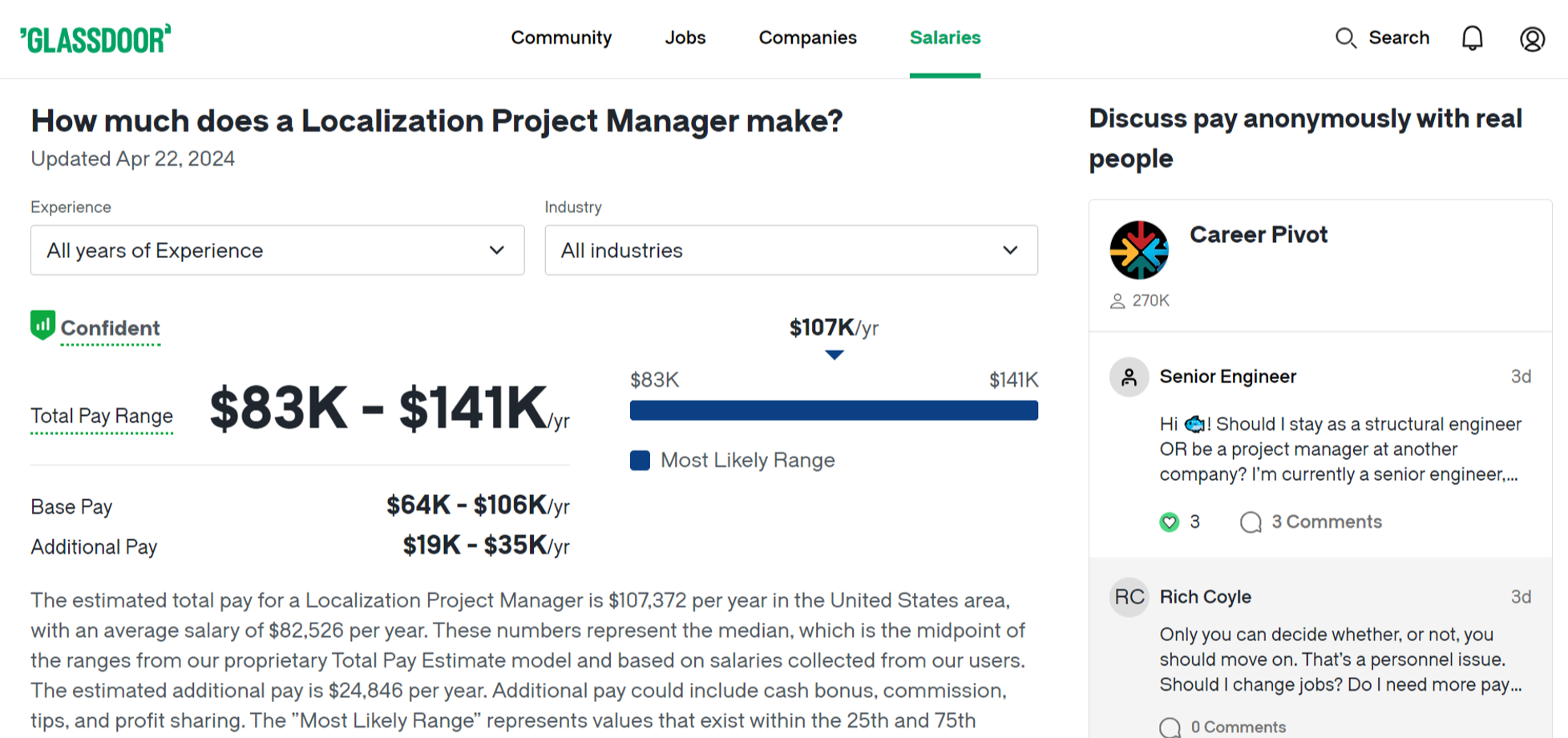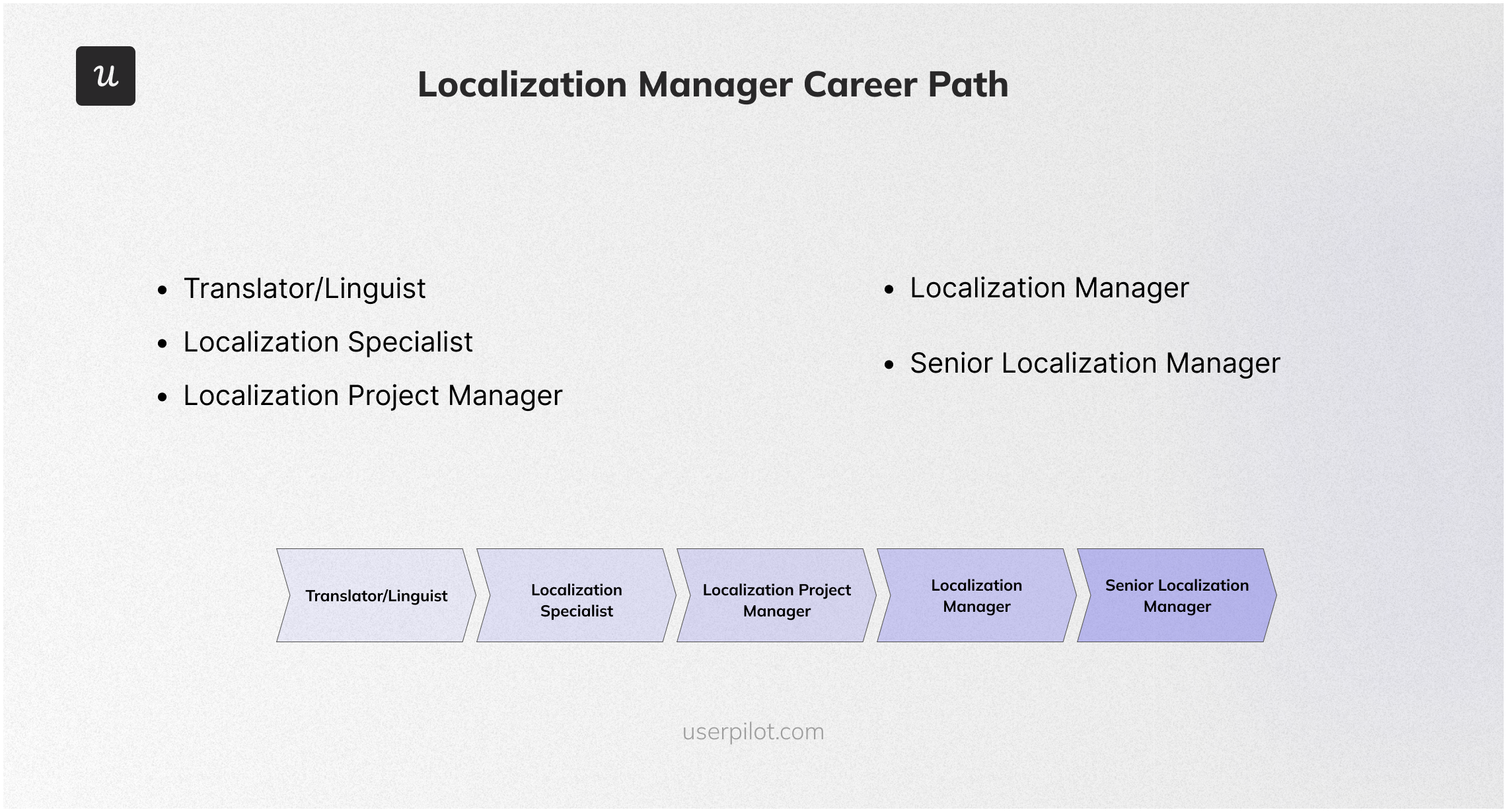![Localization Manager Salary [+ Resources to Advance]](https://blog-static.userpilot.com/blog/wp-content/uploads/2024/06/Localization-Manager-SalaryResources-to-Advance-1-450x295.png)
Try Userpilot Now
See Why 1,000+ Teams Choose Userpilot

What is a localization manager?
When businesses begin to scale, one of the things they begin to do is the international market, and that’s where a localization manager comes in. A localization manager helps a company enter the international market by adapting the company’s product and content to the language and culture of the global audience. A localization manager oversees the localization strategy implementation process from beginning to end while maintaining quality.
Localization manager’s main responsibilities
The responsibilities and duties of a localization manager are multifaceted. They are directly in charge of bringing a product to a regional market. Here is a list of their responsibilities:
- Overseeing the translation project from start to finish. This includes the company’s content, visuals, and entire messaging.
- Beyond just translating, they also ensure that all communication gaps are filled and the messaging resonates well with the global audience.
- Overseeing all tasks assigned to translators and external agencies involved in the translation process, thereby ensuring quality delivery.
- Collaborating with other teams involved in the localization process ranging from legal, product, and marketing to IT.
- Researching the global market and identifying gaps and opportunities to leverage for growth.
- Manages the budget allocated to the localization process, pays external agencies such as translation agencies, and keeps track of the budget.
- Keep accurate track of the localization process and report progress to company stakeholders.
- Optimization of tech tools such as localization tools to ensure smooth and efficient translation.
- Serving as a quality assurance personnel and ensuring the standard of the content is maintained through the translation process.
How much does a localization manager make?
According to Glassdoor, the estimated total pay for a Localization Project Manager in the United States is $107,372 per year, with an average salary of $82,526 per year.
Your salary also depends on a variety of factors, such as your years of experience, the industry you work in, and the location you live in, among other factors. Here is a breakdown of a localization manager’s salary depending level of experience:
- 0-1 year of experience: $63K – $116K/year
- 1-3 years of experience: $65K – $18K/year
- 4-6 years of experience: $70K – $129K/year
- 7-9 years of experience: $77K – $140K/year
- 10-14 years of experience: $77K – $140K/year
- 15 years of experience: $90K – $166K/year
Another factor that determines how much you earn is the industry you work in. According to Glassdoor, the highest-paying industries for localization managers are:
- Information and Technology: $149,850/year
- Media and Communications: $80,392/year
- Management and Consulting: $78,809/year
With the work-from-home model, many companies consider location when paying their employees. Here are the average salaries for some of the biggest cities in the United States:
- San Francisco: $102,853/year
- New York: $92,402/year
- Boston: $85,532/year
- Chicago: $92,881/year
Localization manager career path
The career path for a localization manager is an interesting one when you are enthusiastic and excited about learning. With constant upskilling and as your years of experience increase, you begin to move up the career ladder, and your income does the same. Here is a typical career path for a localization manager:
- Entry-Level Positions (Translator or Linguist): Most localization managers start as translators or linguists. In this role, you help translate the company’s content into the language of the target audience. Proficiency in the audience’s language is, therefore, very important for this role.
- Localization specialist: The localization specialist edits translated content and ensures quality assurance. They also have an in-depth understanding of the target audience and ensure there is a product and content fit.
- Localization Project Manager: As you upskill and get your project management certificates, you can progress to the role of a localization project manager. In this role, localization projects are assigned to you, and you are responsible for their success.
- Localization Manager: The localization manager is in charge of implementing a localization strategy. They manage workflow and ensure all localization projects are going as planned.
- Senior Localization Manager: After some years of more hands-on experience as a localization manager, you can move up the ropes to a senior localization manager, where you have more responsibilities. The senior localization manager carries out the market research, comes up with the localization strategy, and ensures the implementation process goes as planned.
Best practices to be a great localization manager
- Communication: A great localization manager knows how to communicate well with other people involved in the localization process.
- Management: Good managerial skills are needed in the localization process, whether you are managing subcontractors or other members of the team.
- Organization: Managing a localization process means overseeing many activities. Good managerial skills are one of the best practices for a localization manager.
- Attention to Details: You must be able to pay attention to details because you will be overseeing quite a number of activities in the role.
- Budget Planning: There is a budget a company allots to localization. As a localization manager, you need to manage the budget well to get the job done.
Best resources for localization managers
To become a better localization manager and excel in your role, you need access to resources, including podcasts, books, webinars, and blogs.
Best books for localization managers
- The Culture Map: Breaking Through the Invisible Boundaries of Global Business By Erin Meyer: This is a book for localization managers that helps understand the international market and how to expand.
- The Language of Localization by Katherine Brown-Hoekstra: This book defines the terminology in localization that every localization manager needs to know and cites references for future reading. If you are just getting started in localization, this book is a must-read.
- Take Your Company Global: The New Rules of International Expansion by Nataly Kelly: In the book, Nataly Kelly, Chief Growth Officer at Rebrandly, explains the new ways to take your company global.
- A Practical Guide to Localization by Bert Esselink: In the book, Bert Esselink, a localization expert with years of experience shares practical tips on translation and how to localize software products.
- The Art of the Global Gateway by John Yunker: This book explains how you can produce localized website content that drives traffic, leads, and sales. It is a must-read for localization managers looking to produce localized content that sells.
Best webinars for localization managers
- Userpilot Webinars: If you are a SaaS product looking to take your market to the international market, the Userpilot webinar is one to bookmark because of its practical insights.
- Blend Webinars: Blend webinars are practical and insightful interviews with leaders in global companies and one every localization manager should bookmark.
- Braahmam Webinars: In the webinar series, Braahmam shares tips around translation and how to optimize your localized website content for search.
- Lokalise Webinars: The Lokalise webinar helps you grow your knowledge on localization and stay abreast of trends.
- Phrase Webinars: The webinar covers a wide range of topics related to localization, ranging from translation to building a localization workflow. It is a webinar series every localization manager should look into.
Best blogs for localization managers
- Userpilot Blog: The Userpilot Blog is a goldmine for localization managers who want to carry out localization in-app effectively, especially for a SaaS company looking to expand.
- Blend Blog: The Blend Blog is another valuable resource for localization managers. It contains valuable and well-researched content that helps you level up your localization career.
- The DayBlog: If you’re looking to stay updated on trends in the localization industry, the DayBlog allows you to stay on top of current happenings in the industry.
- Clearly Local Blog: The Clearly Local blog shares insights around localization.
- Localize Blog: The Localize Blog is a resource that touches on different topics related to localization. If you want to widen your scope of localization, you should check it out.
Best podcasts for localization managers
- Blend Podcast: The Blend podcast primarily features interviews with people in the localization industry where insights on localization are being shared.
- Translastars Podcast: The Translastars podcast is mostly about how to become a better translator.
- Marketing Tips for Translators: This podcast provides insights on how you can market yourself as a translator. Knowing how to market yourself well can help you get the most from your career.
- The Language Worker by Rita Prazeres Gonclaves: Rita is an expert in the language and localization industry and shares insights on translation and localization on the podcast.
- Wordbee Podcast: The Wordbee podcast is a series of interviews with localization experts, where they discuss matters on localization and share their insights.
Best tools for localization managers
Tools are a very important part of localization because they make your work easier and more efficient. Here are five best tools for a localization manager:
- Best tool for product analytics (Userpilot): Userpilot helps with user research and has a localization functionality that helps your localization process by offering automatic localization of in-app messaging.
- Best tool for project management (Notion): Notion keeps all your projects in one place, helping you manage them effectively.
- Best tool for business intelligence (Power BI): You need to carry out market research on your location and report findings to stakeholders. Power BI is a business tool that comes in handy here.
- Best tool for translation (Weglot): Weglot helps you translate effectively. With Weglot, you can also order professional translation services.
- Best tool for content localization (Motionpoint): Unlike other translation tools, Motionpoint has actual human translators that translate your content. This means more accuracy and better quality translation.
Conclusion
Now that you have a better understanding of the salary range for a localization manager position, you can take steps to improve your earning potential. Consider pursuing relevant certifications, developing your skillset, or negotiating effectively during the job offer stage.
Looking into tools for localization managers? Userpilot is an all-in-one product platform with engagement features and powerful analytics capabilities. Book a demo to see it in action!









